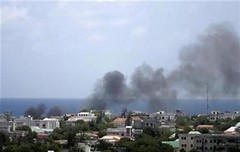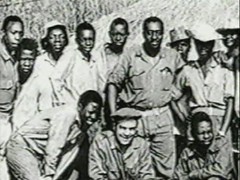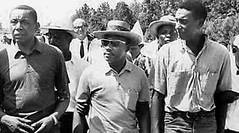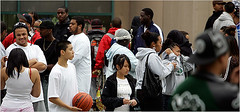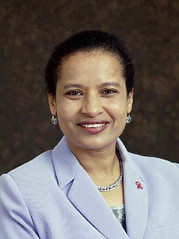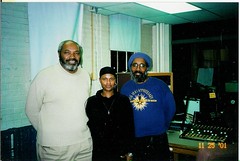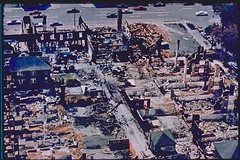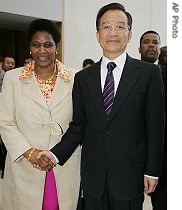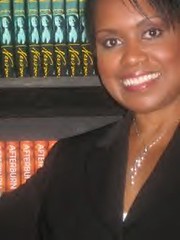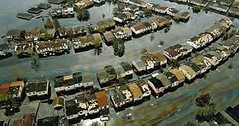PANW Editor's Note: The following article examines the anti-war and anti-imperialist tradition among African organizations and leaders in the United States. This article is being reprinted in honor of the 66th birthday of Kwame Ture (aka, Stokely Carmichael), who was born on June 29, 1941 in Trinidad. Ture joined the ancestors on November 15, 1998.
Forty years ago in 1967, Dr. Martin Luther King, Jr. of the Southern Christian Leadership Conference (SCLC) and Stokely Carmichael (Kwame Ture) of the Student Nonviolent Coordinating Committee (SNCC), spoke forcefully and widely against the United States invovlement in Vietnam.
----------------------------------------------------------------------------------------
The Touchstone, Vol. XII, No. 1, Feb./Mar. 2002
War Time Dissent: A Black American Tradition Vindicated by History
by Lee McQueen
"Huge demonstrations of black protest greeted the Italian invasion of Ethiopia in 1935. Stokely Carmichael's and Martin Luther King Jr.'s public condemnation of the Vietnam War -- against the 'better judgment' of many liberals (Black and white alike) -- was a watershed in the 1960s. The wave of mass opposition to the Reagan-Bush administration's support of South Africa's apartheid regime is likely the most well known example. And more recently, we should not forget that the Congressional Black Caucus stood mostly alone in Congress in protest of the U.S. overthrow of the democratically elected government of Grenada." -- Frances M. Beal, Black America and the Struggle for Peace, Michigan Citizen, October 21, 2001.
The attacks of September 11th, the release of the Ali movie, the celebration of Martin Luther King's birthday, and the advent of Black History Month otherwise known as February have converged to fill me with a sense of urgency in drawing together the threads of time that link Black American presence in America from slavery to the present as voices of dissent and concern for America's morality. When reading coverage of the "traitors, cowards, and terrorist sympathizers" who happen to be Black, lurking among the "true patriots" who happen to be White, it causes me to raise the question ... How on Earth Did We Ever Get Here? How did criticism and caution come to equal treason and sympathy for terrorism? Rather than going on at length on how I feel about the racial epithets that accompany the typical "If you hate America so much then go back where you came from" recommendation, and rather than make repeated attempts to justify dissent as a cornerstone of democracy, I wish to allow history and the passage of time to do that by providing an extensive list of quotes from historical Black dissenters whose words and deeds garnered hatred and anger from the moderate-to-conservative mainstream of both Black and White cultures at the time.
Frederick Douglass was the most effective and imposing Black speaker and author of his time, he being a former slave, abolitionist, editor, orator, reformer, and champion of human rights. Doubtless, Black men and women held opinions of America's war policies prior to Frederick Douglass, particularly since Black men had fought on behalf of America in both the war of Independence in 1776 and again in 1812. But written records of Black opinion and thought are understandably scarce since reading and writing by Blacks was against the law and most Whites were not interested in how they felt about the wars of that time.
From Frances Beal's commentary on Black America and the Struggle for Peace published in the Michigan Citizen, October 21, 2001 we know that "As far back as 1848, for example, Frederick Douglass condemned U.S. aggression against Mexico as disgraceful, cruel and iniquitous. His son Lewis spoke out 51 years later to deplore U.S. policy in regard to Cuba, the Philippines, Hawaii and Puerto Rico as hypocrisy of the most sickening kind." In his speech "What to the Slave is the Fourth of July?" delivered on July 4, 1852, and published in My Bondage and My Freedom, Frederick Douglass also commented on the celebration of America's War of Independence from Great Britain by saying, "What to the American slave is your Fourth of July? I answer, a day that reveals to him, more than all other days in the year, the gross injustices and cruelty to which he is the constant victim ... Go where you may, search where you will, roam through all the monarchies and despotisms of the old world, travel through South America, search out every abuse, and when you have found the last, lay bare your facts by the side of the every-day practices of this nation, and you will say with me, that for revolting barbarity, and shameless hypocrisy, America reigns without a rival." And in so doing, Douglass laid the foundation for the worthy and honorable tradition of protesting America's efforts for imperialism and colonialism and suppression of people of color as a foreign and domestic policy to uphold White supremacy.
Black press, in general, followed the tradition of Douglass's editorship by using the written word as a tool to voice their opinions on the marginal status of the Black in America. For instance, a Baltimore Afro-American editorial written in December 29, 1929 makes the statement regarding the dispatch of Marines to Haiti during bludgeoning and lynching of blacks in Sherman, Texas: "If the marines must fight, we suggest that President Hoover order them to Mississippi, Alabama, Texas and Georgia."
Further, Richard Wright, prior to the Pearl Harbor attack that marked the entry of the United States into World War 2 delivered a speech, "Not My People's War", on June 6, 1941 before the League of American Writers council meeting. He basically stated that WW2 was not a war black people should participate in because of their treatment in America. However, in a show of solidarity and in an effort to "close ranks" to score the "double-v" of victory (equality) at home and conquest abroad for Black enlistees, Wright modifies his tone on December 15, 1941 by stating, "I pledge my loyalty and allegiance, without mental reservation or evasions, to America. I shall through my writing seek to rally the Negro people to stand shoulder to shoulder with the Administration in a solid national front to wage war until victory is won." (Michael Fabre, The Unfinished Quest of Richard Wright, University of Illinois, 1993). Like Frederick Douglass during the Civil War and W.E.B. Dubois during World War 1, Wright held the optimistic view that if Blacks proved their loyalty to the United States government by fighting for freedom abroad, they would reap the reward of freedom at home. In the later Cold War years, W.E.B. Dubois made a joint statement with actor/activist Paul Robeson and Benjamin Davis, et al, "We Charge Genocide" in New York in 1951. "White supremacy at home makes for colored massacres abroad ... lyncher and the atom bomber are related." And so, Dubois recognized that silent, quiet loyalty breeds the perception of acquiescence to the unacceptable status quo of second-class citizenship of Black Americans.
A Crisis editorial LVIII written in the August-September edition in 1950 outlines the recognition by Black Americans that their treatment within U.S. borders mirrored the treatment of people of color abroad by the U.S. The hypocrisy and irony of America's stance for freedom was impossible to ignore: "... We will never win the political war in Asia as long as Koreans and Asiatics are gooks in the eyes of our fighting men. Whether we know it or not, Asia is in revolution. Her people fight for nationhood. Here is America's opportunity to live up to her own revolutionary past by helping the struggling masses of Asia to economic security and political independence."
Paul Robeson stepped up to the plate to confront America's march towards imperialism and made it relevant for Black Americans in his autobiographical book Here I Stand, "... if we don't stop our armed adventure in Korea today tomorrow it will be Africa." And earned the full wrath, hatred, and anti-communist hysteria that laid in wait for Blacks who protested the United States government for any reason whether it be lynching, brutality, discrimination, etc. Robeson continues, "When will Americans learn, that if they would encourage liberty in other countries, they must practice it at home? ... The world has learned the terrible lesson of Hitler: racism, backed by the power and technology of a modern industrial state, is a monster that must never be unleashed again. What difference is there between the Master Race idea of Hitler and the White supremacy creed of Eastland? Who can convince the European peoples that the burning cross of the white-robed Klan is different from the swastika of the Brownshirts? America, of course, is not a fascist nation, but the deep-rooted racism here and its violent outbursts arouse the worst fears of those who survived the holocaust of Hitlerism." From the Autobiography of W.E.B. Dubois, Robeson's treatment as a direct result of his dissent is assessed thusly by Dubois: "The persecution of Paul Robeson by the government ... has been one of the most contemptible happenings in modern history."
Thus, we learn that it was not only writers and scholars who practiced dissent as an American tradition. Artists and entertainers with the benefit of worldly experience on foreign stages were able to assess their domestic situations with a broad view.
Josephine Baker spoke to Critica on October 6, 1952 and said the following in regards to World War 2: "I met thousands of Americans from the North and from the South. They believed, in good faith, that they were fighting for democracy and civilization that were being menaced by totalitarianism. Many had no hesitation in expressing their horror and their indignation at the news of massacres of Jewish prisoners. But as for the Negro, the Southerners still continued and now keep on thinking that all the evil that is done is all right, and is necessary. How they reconciled these two opinions is something I have still not been able to figure out." She continues her insightful observations by saying, "Unless there is a halt to the wave of lynchings, electrocutions without proof, collective aggressions and other beauties of the American way of life, it means that all the blood spilled in the last war has been in vain. The apparent enemies of Hitler see his triumph multiplied in the Southern United States." Like Robeson, Baker caught the attention of the U.S. government enraged by her audacity in speaking with foreign press about "family issues."
However, the efforts to censor and red-bait and ruin did not stop Louis Armstrong in the Fall of 1957 from remarking, "The way they are treating my people in the South, the government can go to hell ... The people over there [Soviet Union] ask me what's wrong with my country, what am I supposed to say? ... The Government could go to the devil with its plans for a propaganda tour of Soviet Russia."
Malcolm X, the ultimate Black radical is quoted in Clyde Taylor's Vietnam and Black America as saying, "If it is right for America to draft us, and teach us how to be violent in defense of her, then it is right for you and me to do whatever is necessary to defend our own people right here in this country." Malcolm X was assassinated in 1965.
Risking the benevolence of White liberals and alienating many Black supporters, Martin Luther King Jr., acknowledged his internal disturbance regarding the Vietnam War in several sermons. In "Strength to Love" delivered in New York in 1964, he said: "We must not engage in a negative anti-Communism, but rather in a positive thrust for democracy ... we must with positive action seek to remove those conditions of poverty, insecurity, injustice, and racial discrimination which are the fertile soil in which the seed of Communism grows ... Millions of citizens are deeply disturbed that the military-industrial complex too often shapes national policy, but they do not want to be considered unpatriotic. Countless loyal Americans honestly feel that a world body such as the United Nations should include Red China, but they fear being called Communist sympathizers. A legion of thoughtful persons recognizes that traditional capitalism must continually undergo change if our great national wealth is to be more equitably distributed, but they are afraid their criticisms will make them seem un-American." His words are profound and prophetic because King WAS considered un-American and a communist sympathizer because of his views on civil rights and peace. Martin Luther King gave a speech at fundraiser for the Nation magazine on February 25, 1967: "We are engaged in a war that seeks to turn the clock of history back and perpetuate white colonialism. The bombs in Viet Nam explode at home and they destroy the hopes and possibilities for a decent America ... We must combine the fervor of the civil rights movement with the peace movement. We must demonstrate, teach and preach, until the very foundations of our nation are shaken." Finally, Martin Luther King Jr. joined Stokely Carmichael at a United Nations rally in 1967 fully protesting and dissenting the draft of Black men for the Vietnam War: "Hell no, we wont go!"
Black wartime dissent boiled over in 1967. Martin Luther King Jr. even commented on rising Republican political hawk and future Cold Warrior, Ronald Reagan in Domestic Impact of the War: "... a Hollywood performer, lacking distinction even as an actor..." The ever-loquacious Muhammad Ali declared, "I ain't got nothing against them Viet Congs. No, I'm not going ten thousand miles from here to help murder and kill and burn another poor people simply to help continue the domination of white slavemasters over the darker people the world over." Moreover, "I ain't got no quarrel with them Viet Cong." (G. Marine, Nobody Knows My Name, Ramparts, 5:12, June, 1967). And finally, the famous exclamation, "No Viet Cong never called me nigger!" the quote that Ali borrowed from Stokely Carmichael. Ali was rewarded for his defiance with attacks by mainstream press, a jail term, the stripping of his heavyweight championship title, and a distancing of the Black mainstream that supported the U.S. foreign policy.
Martin Luther King Jr. continued to voice dissent of the Vietnam War with his speech, "Where Do We Go From Here?" delivered in New York, 1968, losing the support of many followers, gaining the support of others: "These are revolutionary times. All over the globe men are revolting against old systems of exploitation and oppression, and out of a frail world new systems of justice and equality are being born. The shirtless and barefoot people of the earth are rising up as never before." King was assassinated later the same year.
Eldridge Cleaver, in a bid to reach moderate Blacks who absorbed war propaganda through choice or intimidation, warned, "Once the white man solves his problem in the East, he will turn his fury again on black people in America." (Soul on Ice, New York: McGraw-Hill, 1968).
The bitterness and anger of the rapid succession of assassinations [Malcolm X, JFK, King, RFK], the blood in the jungles of Vietnam and Cambodia, and the blood on the streets of urban America took its toll on American society as a whole. An unnamed Black Veteran speaks a widely felt sentiment of Black men in America, "The brothers thought that because they fought and saw their buddies die it would make a difference. But they came back to SOS-the same old stuff ... It's business as usual in America, and business as usual means black people are going to catch hell." (Thomas Johnson, "Negro Veteran is Confused and Bitter", New York Times, 29 July 1969).
As did entertainers Robeson, Baker, and Armstrong previously, artists used their unique gifts to express the pain and confusion of a world that no longer made sense. Marvin Gaye asked the million-dollar question: "What's goin' on?" and beautifully articulated the observations: "There's too many of you crying" and "There's far too many of you dying" and "We don't need to escalate" and "War is not the answer" and revealingly "Picket lines and picket signs, don't punish me with brutality." (What's Goin' On? 1971). In addition, Harry Belafonte, Dick Gregory, Diana Ross, Jimi Hendrix denounced the war while keeping their audiences intact. By that time, dissent was no longer a unique experience among Black Americans. Charles B. Howell, a retired black veteran of 22 years of service stated that, "I think I'd shoot one of my kids before I let them fight for this country." (Richard Strayer and Lewis Ellenhorn, "Vietnam Veterans: A Case Study Exploring Adjustment Patterns and Attitudes", Journal of Social Issues, 31:4, 1975).
Fast-forward to the events of September 11, 2001. An unbelievable, unthinkable, unimaginable, horrible tragedy gripped the American psyche and held it hostage to visual imagery of towering, burning infernos sparked by terrorism. The calls for revenge, retaliation, and blinding eye-for-an-eye jingoism began immediately.
Congresswoman Barbara Lee (D-CA) rose before the House of Representatives to explain her lone vote against use-of-force resolution on September 14, 2001. "There must be some of us who say, lets step back for a moment and think through the implications of our actions today. Let us more fully understand their consequences. As we act, let us not become the evil that we deplore."
With Liberty at Risk written on September 19, 2001, John Conyers (D-MI) who represents a large Arab population, warned: "Historically, it has been at times of inflamed passions and national anger that our civil liberties proved to be at greatest risk, and the unpopular group of the moment was subject to prejudice and deprivation of liberty. In 1798, Congress enacted the notorious Alien and Sedition Acts, making it a federal crime to criticize the government. In 1861, at the beginning of the Civil War, President Lincoln suspended habeas corpus, citing the need to repress 'an insurrection against the laws of the United States.' Ulysses S. Grant sought to expel Jews from southern states. World War II brought about the shameful internment of Japanese Americans, which even the Supreme Court failed to overturn."
The voice of caution and concern rose again with Michael Eric Dyson's appearance on Politically Incorrect, September 24, 2001. From the transcript, his views require no additional context. "... in Tulsa, Oklahoma, an all-Black community was established historically established. They had their own banks, their own systems of delivery of goods and services: highly educated Black people. And because of the resentment, the collective resentment of the white folk, who were there against the Black folk, they went out and looted their stores, burned their homes, and killed these people in massive numbers. And I'm saying, what's interesting to me is that, now that I see America hurtling toward war, I ask, should Black people have responded against their white brothers and sisters in the same way that we now want to respond to our brothers and sisters throughout the world? I don't romanticize bin Laden, because he started in Africa [allegedly bombed the U.S. embassy in the Sudan]. Let's not get it twisted. He doesn't have solidarity with people of color. The reality however, is that African-American people in particular, but others as well, understand that low-grade terrorism is what we confront in this nation every day. You tell me about arbitrary violence. What happens if you think my son who lives in Atlanta, will he go out today and, reaching for his wallet some policeman mistake it for a gun and then murder him? I tell you, that's terroristic to me. Now, it's low-grade, it's not on the spectacular scale about which you've spoke, but it is an insidious every day factor that robs us of a sense of security in this nation. And that's what I think we all feel. That's why I say were all Black now. Everybody understands what it means to be Black right now in America."
Aaron McGruder, author of The Boondocks comic strip [http://www.ucomics.com/boondocks] determined that there is more to the terrorist attacks than the American public is allowed to hear and on October 4, 2001, pens a cartoon that is pulled from major newspapers for mocking a former president and the investigation (or lack thereof) into the September 11 tragedy. "Huey calls the FBI's terrorism tip line ... I'm very serious. I know of several Americans who have helped train and finance Osama bin Laden ... The first one is Reagan. That's R-E-A-G ... Hello? Hello?"
Congresswoman Cynthia McKinney's "Official Statement" of October 16, 2001 provided a caveat to her vote of support in Congress: "... When I voted for the War Powers Resolution, I did not surrender my right to express my views and opinions or to continue to advocate for justice and human rights in America or around the world. I believe that American security will be enhanced by a foreign policy that positions the United States as an honest broker for justice in the Middle East."
Danny Glover's speech at an anti-death penalty forum at Princeton University on November 16, 2001 inflamed right-wing vituperation and calls for a boycott and blacklist chillingly reminiscent of Paul Robeson's treatment during the Cold War almost fifty years earlier. Glover stated, "This week, President Bush implemented a military tribunal which will make it easier for us to execute (people). This clearly is a slippery slope. We must stand vigilant against Bush in these times ... We shouldn't let the federal government destroy individual rights."
The sharp dissent continued with Boots Riley of the rap group, The Coup, whose album cover strangely foretold the events of September 11th before it was pulled prior to distribution. "There are mainstream artists I know who are against the war but think they'll be blacklisted if they come out officially against it. They don't want to get involved. The silence is huge. People are scared. They're so used to media making it seem like no one is dissenting in this war that they're afraid to voice their opinion ... I want to fight the McCarthyist state that's developing in this country so my kids won't live in a world where people are afraid to speak out. I've always done that, but I have to work even harder now." (The San Francisco Chronicle, November 18, 2001).
More of Generation X continued to make their views public when Kevin Powell shared dialogue on January 23, 2002 with Davey D's Hip Hop Corner on the Internet at http://www.daveyd.com/FullArticles/articleN958.asp. "... I thought about Black people, a lot, Charlie. Black people are not new to tragedy, as you well know. As Langston Hughes once said eloquently in a poem, I've known rivers. Collectively, we've known rivers. So I saw this tragedy with a different set of eyes, so to speak. I saw it with the eyes of a people who had been ripped from their native land, Africa, stripped of themselves, their language, their spirits, their minds, made to hate themselves, and made into slaves. That, too, is a form of terrorism to me.
"I saw it with the eyes of a people who had been told they were free, after slavery, only to endure another 100 years of second-class citizenship, only to endure lynchings, cheap or underpaid labor, the stealing of whatever land some of them might have had (as had happened to my great-grandfather in South Carolina), denial of the right to vote, denial of the right to be a citizen and, really, denial of the right to be human beings.
I saw it with the eyes of a people who, in spite of the great Civil Rights Movement, still had to live in the ghettoes of America, the majority of us, anyhow, dealing with poor communities, poor schools, poor resources, just a vicious cycle of poverty and madness. And I saw it with the eyes of folks in our communities who have and do experience their own form of terrorism, what I think Michael Eric Dyson called slow terrorism because of what things like AIDS and crack and police brutality have done to us, and does to us everyday ... When I think about all the reactions that have come since September 11th, the detaining of Arab Americans in this country, the plans to deport thousands of Arab Americans who are suspected of criminal activity, the deep anti-Muslim sentiments, the zealousness with which many people in and outside of the government have called for war and revenge, the calls for United We Stand, the waving of American flags and the wearing of flag tee shirts, hats, pins, and other items, I can't help but wonder how wounded America was as a country before September 11th if we could be so instantly reactionary after the tragedy. In other words, given the magnitude of what happened, does it not make sense for us to assess everything? History, American foreign policy, this country's on-going problem of dealing with its own racism toward people of color, the propensity of this country to solve everything by violent means ..."
Frances M. Beal clarifies the history of Black dissent further with the article, "Black America and the Struggle for Peace" (October 2001). "Our distinct history as a specially oppressed people -- as property, as cannon fodder, as second-class citizens, as targets of state terror in the form of police violence -- is the taproot of identification with the oppressed throughout the world. No amount of patriotism can hide another ugly truth. The burden of war takes a tremendous -- and disproportionate -- toll on the Black community. According to official Department of Defense statistics regarding Vietnam, "Blacks were more likely to be (1) drafted (30% to 19%); (2) sent to Vietnam; (3) serve in high risk combat units; and consequently, (4) to be killed or wounded in battle." In fact, between 1961 and 1966 Black casualties topped 20% of total combat fatalities -- when Black youth aged 19-21 constituted only 11% of military personnel in Vietnam. Today, it is estimated that Blacks constitute 25% of the military, and in ground troop personnel, estimates range as high as 35-40%."
No wonder Black people choose to dissent when their very lives are at stake!
Rap group, Public Enemy, declared the same eleven years prior in the song, "Bring the Noise" from It Takes a Nation of Millions to Hold Us Back (1988). "They'll never care for the brothers and sisters now across the country has us up for a war."
And my conclusion as it relates to the backlash against those Blacks who chose to speak out in wake of the terrorist attacks this past September is as follows: History has vindicated the Black radical, the subversive, the so-called "traitors" and "un-American evildoers," and all other "ungrateful" Black Americans who stood against the mainstream and chose to voice their dissent of policies they deemed as truly un-American and destructive to the lives of American citizens each and every single time. From Slavery and Jim Crow, to the Cold Wars in Korea and Vietnam, Black dissent and protest of America's over-expansion of power against poor people of color foreign and domestic has been vindicated by the passage of time as legitimate criticism protected by the First Amendment and historically, the moral and right choice.
The hated and the hunted, the surveilled and the jailed are revered as American icons today Frederick Douglass, Martin Luther King, Muhammad Ali, Fannie Lou Hamer, Sojourner Truth, Ida B. Wells, etc. What is unfortunate is that their vindication arrived decades after their deaths or during their slow decline to old age. The apologies and admissions of mistaken judgment allow those who actively sought to destroy their lives to ease the pain of a guilty conscience and mistakes in judgment.
Which leads me to wonder how long will it take for Congresswoman Barbara Lee, actor Danny Glover, and others who put their careers, their reputations and their very lives in danger by cautioning against rash military action in vengeful response to terrorist actions on September 11th? How long will it take before even moderate Black, White, Yellow, Red, and Brown Americans who currently support the U.S. governments hawkish foreign policy begin to understand how past declared and especially undeclared wars turned on the poor and ethnic groups in America as scapegoats? From the Cold War which red-baited and race-baited civil rights activists as communist sympathizers to the Drug War which baited people of color, particularly inner-city dwellers as criminal predators, soft-on-crime, and criminal sympathizers to this current War on Terrorism which brands any dissenter, any Arab, any Muslim, as a terrorist traitor and/or sympathizer, it is possible to see a repetition of social control through fear and scapegoating of ethnic groups via "wartime" propaganda.
Dissent is not only an American tradition since slavery for Black Americans, it is a patriotic, constitutional duty for all Americans to show love for ones nation by ensuring the principles upon which it was founded remain in place for the next generation as explained by The Coups Boots Riley. To stand silently by while the Constitution is violated via a presidential election concluded by voter disenfranchisement, while unofficial war is declared by a president who bypassed Congress, while citizens and foreign nationals who share characteristics with the alleged terrorists are rounded up on "secret" evidence, while anti-terror legislation is implemented that violates civil liberties, and government "of, by, and for the people" withdraws into secrecy in the face of alarming changes to long-standing tenets of democracy .. is unpatriotic, anti-democratic, and un-American. Repressive behavior such as this more resembles a police state and dictatorship rather than a democracy worthy of being called America. It is time to reflect and learn from America's violent past beginning with Native American genocide, the Spanish Inquisition in Mexico, the Salem Witch Hunts, Slavery, Jim Crow, Southern Lynching, McCarthyism and Red-baiting, COINTELPRO against civil rights groups, assassinations, and the Drug War all distinctly un-American, but, actually, so very American.
It may be that I, myself, will be asked to respond to the long-standing, famous question "If you hate America so much, why don't you go back to Africa?" My response would be similar in nature to that of Paul Robeson when the House Un-American Activities Committee questioned him in 1956. One of the congressional investigators asked why, if Robeson liked Russia so much, "... why did you not stay in Russia?" And Robeson responds, "Because my father was a slave, and my people died to build this country, and I'm going to stay right here and have a part of it, just like you. And no fascist-minded people like you will drive me from it. Is that clear?" Black Muslim and Nation of Islam leader Minister Louis Farrakhan echoes Robeson's powerful words with this statement of September 22, 2001, broadcast via satellite and Internet "... I'm critical of the government in aspects of their behavior toward Black people. It doesn't mean I hate America. I'm critical. And because I have the freedom, because of that great constitutional guarantee, to speak even if people do not like what I say, it is the freedom to speak that guarantees America a greater future. When you stifle voices that may disagree with you, you're only stifling something that could cause you to reason beyond your own bias, your prejudice, or your own views..." Criticism does not equal hate. Criticism equals a desire to see a better world and a full realization of potential.
I am an American. This is my country. It is my home. I refuse to sit idly and silently by while it is diminished by greed, fear, and hatred. History, as I've shown here, tells me and you that it is our patriotic, democratic, American duty to dissent against a government that has cut itself off from accountability and no longer exists "of, by, or for the people." To not dissent is unpatriotic and un-American.
Additional works cited:
Finkle, Lee. Forum for Protest: The Black Press During World War II. Madison: Associated University Presses, 1975.
Gilmore, Brian. "Stand By The Man: Black America and the Dilemma of Patriotism". The Black World Today, December 28, 2001.
Krenn, Michael L. (editor). Race and U.S. Foreign Policy from the Colonial Period to the Present: A Collection of Essays. New York: Garland Publishing, Inc, 1998.
Robeson, Paul. Here I Stand. Boston: Beacon Press, 1971.
Smith, Jessie Carney (editor). Notable Black American Men. Detroit: Gale, 1998.
Lee McQueen is Assistant Professor and Social Sciences Librarian at a major public university.
